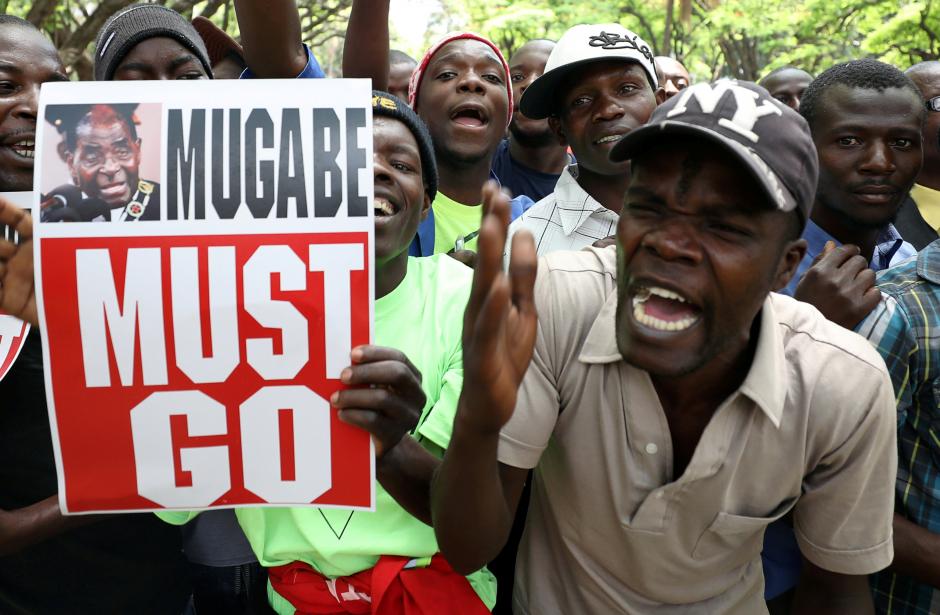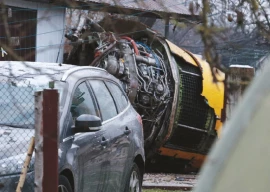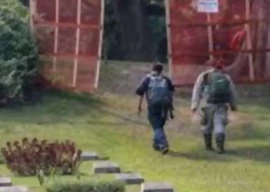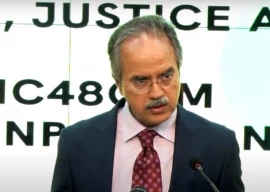
In the last week, the 93-year old has clung on in the face of an army takeover that shattered his authority and expulsion from his own ruling ZANU-PF party, which also told him to leave power.
Thousands of people have joined mass protests against him and calls to resign have come from many sides, including on Tuesday from the ruling party's favourite to succeed him, Emmerson Mnangagwa.
Ousted Zimbabwe deputy president asks Mugabe to resign
Parliament Speaker Jacob Mudenda said he received a motion to impeach and lawmakers would adjourn to a hotel to start the proceedings later on Tuesday.
Thousands or people demonstrated outside parliament urging his resignation.
Since the crisis began, Mugabe has been mainly confined to his lavish "Blue Roof" residence in the capital.
Mugabe led Zimbabwe's liberation war and is hailed as one of post-colonial Africa's founding fathers and a staunch supporter of the drive to free neighbouring South Africa from apartheid in 1994.
But many say he has damaged Zimbabwe's economy, democracy and judiciary by staying in power for too long and has used violence to crush perceived political opponents.
The country faces a foreign exchange payments crisis and roaring inflation.
President Mugabe stuns Zimbabwe by defying pressure to resign
South African President Jacob Zuma and his Angolan counterpart, Joao Lourenco, will travel on Wednesday to Zimbabwe in a fresh sign of diplomatic pressure, South Africa's state broadcaster said.
Mugabe held his weekly cabinet meeting on Tuesday but only five ministers and the attorney general turned up. 17 others
opted to attend a meeting to plan the impeachment.
"The people of Zimbabwe have spoken with one voice and it is my appeal to President Mugabe that he should take heed of this clarion call ... to resign so that the country can move forward and preserve his legacy," Mnangagwa said in a statement.
Succession plot
The origin of Mugabe's sudden downfall lies in rivalry between members of Zimbabwe's ruling elite over who will succeed him, rather than popular protests against his rule.
The army seized power because Mugabe sacked Mnangagwa as vice president this month to smooth a path to the presidency for his wife Grace, who is unpopular with many Zimbabweans because of her perceived lavish lifestyle.
Reuters reported in September that Mnangagwa was plotting to succeed Mugabe with army backing at the helm of a broad
coalition.
The plot posited an interim unity government with international blessing to allow for Zimbabwe's re-engagement with the world. Its main aim was to stabilise its economy.
The former vice president was a key lieutenant to Mugabe for decades and stands accused of participating in repression against Zimbabweans who challenged the leader.
Mnangagwa said he has fled Zimbabwe because of a threat to his life after being purged from the ruling party. He said he had been in contact with Mugabe and invited to return but would not do so until his security could be guaranteed. Mnangagwa said his desire was to join all Zimbabweans in a "new era" that would rebuild the economy for the benefit of all.
Zimbabwe's ruling party set to sack Mugabe
Zimbabwe's top general Constantino Chiwenga said on Monday the takeover, dubbed "Operation Restore Legacy", was progressing well.
He said Mugabe and Mnangagwa had been in contact since Mugabe's speech on Sunday in which he defied calls to step down.
In the draft impeachment motion, ZANU-PF said Mugabe is a "source of instability", flouting the rule of law and presiding over an "unprecedented economic tailspin" in the last 15 years.
It also said Mugabe had abused his constitutional mandate to favour his wife Grace. On Saturday, hundreds of thousands took to the streets of Harare to celebrate the ruler's impending fall.

















COMMENTS
Comments are moderated and generally will be posted if they are on-topic and not abusive.
For more information, please see our Comments FAQ